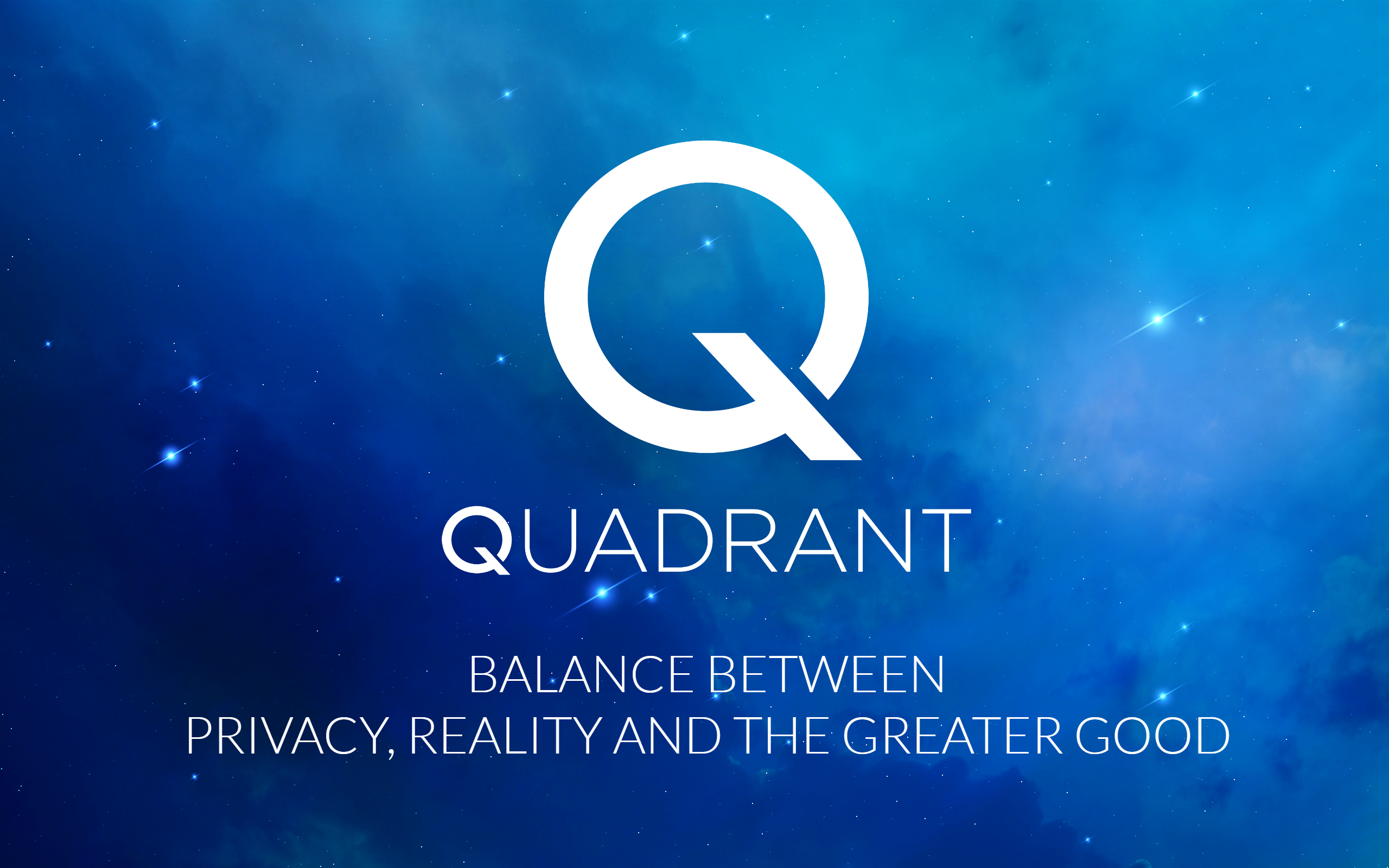
WEF must strike a balance between privacy, reality and the greater good
An opinion published in The Economist by William Adams, better known as will.i.am, to coincide with this month’s World Economic Forum in Davos proposed an uncompromising stance in the intensifying data privacy debate.
“The ability for people to own and control their data should be considered a central human value. The data itself should be treated like property and people should be fairly compensated for it,” the respected musician and entrepreneur wrote.
The piece poses some very interesting and challenging questions that everybody in the big data industry should be asking themselves.
As data professionals, at Quadrant we concur with much of Mr Adams diagnosis of the problems and share his optimism and faith in a better more transparent and fair data economy.
We all agree that nobody wants a big corporation messing with your private data. And with every new data breach scandal, the public opinion is increasingly outraged by the amount of money big corporations such as Google, Facebook and Amazon extract by trading off our digital footprints.
So, why not give the people absolute control over their data?
And moreover, why not let people make money by deciding which data they want to share and which they prefer to keep private?
As appealing as it sounds, this concept has some serious flaws and reflects a widespread misconception of what we can and should do with personal data. Perhaps, one of the reasons for the misunderstanding is the habit of equating the idea of data to money.
But data is not just the “new oil” for the knowledge economy. Data are also facts. Tiny bits of micro information, that, when aggregated, can be used to unleash societies’ hive-mind power to build smarter cities, run more efficient businesses and improve any decision-making process, from healthcare to economic policies.
Analyzing the problem from different angles can help to have a better grasp on where the problem really lies.
Hopefully, this will lead to more realistic expectations — and demands — of what the data industry and its regulator should do.
Can we own and personally manage all the data we produce?
The short answer is, no.
Having full control of all your data sounds fair and no doubt such a utopian quest will attract many supporters.
But, while it is easy to say, it is extremely difficult, if not impossible, to achieve.
As CEO of Quadrant, a company managing more than 57 billion real-time data records per month, I know what it takes to deal with such an avalanche of information. The legal, technical, administrative and financial nightmare that would unfold with such a move in this direction would far outweigh the benefits.
With ownership comes responsibility. Given the sheer volume of data each person produces constantly as they go about their daily lives, few are likely to be able or even want to personally manage their data to ensure their benefit. If I have a young baby, I want the supermarket to have diapers in stock when I shop. In the current data world, when I shop for diapers and use a loyalty card, data is generated both on the store’s cashier register system as well as by the loyalty card program. This is my personal data.
But I do not want to have to be managing notifications to the shippers so that they can efficiently manage store supplies, nor authorize the store to share my aggregated data each time they need to.
The store’s loyalty card program or ERP system provides data that links to the supply chain and recognizes when a new batch of baby supplies should be shipped. I can give up absolute ownership of my data for that kind of shared benefit.
As a collective, hundreds of millions of people should not be part of this process, it is unreasonable, we need to balance between complete control and effectiveness and efficiency of how we use data.
Mr Adams proposes: “Personal data needs to be regarded as a human right, just as access to water is a human right.” But as a practical matter, this proposal implies having a central data repository for every individual, probably under the management of some kind of public authority as with water distribution.
Ironically, this would in fact lead to a bigger privacy risk.
Does this mean, then, that we should abandon any effort to protect and control our personal data?
Of course not.
But our approach should be realistic and practical. At Quadrant, we believe in bringing organization to the chaotic world of data. By mapping and authenticating data, we can help create order to reduce abuses of privacy.
Still, saying individuals should be proprietaries of all the data they produce is as far-fetched as saying they should control none of it.
Who owns the facts?
“Payment is one way to redress the balance. If personal data has been used to build a handful of companies that exceed $3trn in market value, it should absolutely have monetary worth,” Mr. Adams asserted. And here is a crucial question. What can be considered your private data and what is to be treated as public?
Not all our data should be treated as “monetizable asset”. Our data are also facts making up the broader context we live in.
For example, if I drive my car through a toll booth, who owns the fact that I passed by a precise point at a precise time? Should I be the one to decide how this information is going to be used? Who decides if this aggregated data can be shared with the emergencies services to improve response plans with the best routes at different times to reach a car accident? Should it be up to every individual to decide whether to allow the authorities to use the transit data to take measures against congestion? Or help infrastructure contractors determine when to do maintenance work on the road?
This is not a new concept. For centuries, governments and public authorities from all over the world have tried to make the best population census as possible. This information is core to planning the provision of healthcare, education, employment, transport and as a major economic tool.
Would we dare to propose to monetize our census information, knowing that its accuracy translates into better schools, roads, health care facilities, senior centers? “The information generated by a population and housing census — numbers of people, their distribution, their living conditions and other key data — is critical for development,” says the United Nations Population Fund.
What’s the greater good?
Perhaps some people strive for a simplistic view to limit what should be considered public data. They say “public” data is data for the greater good. But this, again, is a more nuanced idea.
Who decides what constitutes the greater good? Let’s say I buy groceries at the corner store using my credit card. That single and mundane action will fire up a raft of processes from the credit card company from checking my bank balance to see if I have funds, to checking anti-fraud activities to providing payment to the store. And it also produces a huge amount of data — on the kind of cereal I purchased, when and where, and along with which products, or, even, when cross-referenced with other sources, whether I shop on rainy days. For sure, this information is incredibly useful for marketing professionals to run more effective campaigns and for business development teams, to design more attractive products. And perhaps we feel we are entitled to own, manage and sell that information. That is a fair point.
But we should also consider that piece of information triggers more processes. For example, it is used to make more efficient the distribution of goods so that the supply chain can react in a more efficient way. And business efficiency can translate into lower production and transportation costs, with lower environmental impact and lower consumer prices and more affordable products. That would seem to add up to a greater good.
Sometimes we forget that our personal data are just a minuscule but necessary point for drawing the big picture. Just the data I produce turning on and off my house lights can tell a lot about who I am, and how I live. From the time I usually go to bed to which months I prefer to stay at home, to how many times I have hosted my friends and family, my electricity patterns can be considered a sound insight into my habits. But at the same time that information can be used to secure the energy supply and a more efficient use of renewable energies. It is unreasonable to expect that I should be in control here and dictate how this data is used.
Blockchain vs “The Data Monarchs”
Perhaps, Mr Adams and I don’t agree on the best solution to the data privacy problem. He believes that giving people full control over their data will solve the problem. I think it won’t, and can even make things worse, eliminating many of the benefits of big data and creating further inequality.
That said, I fully subscribe to his belief that it is more important than ever to educate consumers, especially young people, on what data is, why it is so valuable and how to safely manage their privacy. But how should we solve the problem of “the data monarchs” -as Mr. Adams called companies such as “Facebook and Google” that grew rich trading their users’ information often without their full knowledge and sometimes compromising their data? I think we should first change the data space, from its core, in a realistic way.
The combination of blockchain and Artificial Intelligence can help to shape a trustable, transparent and verified data supply chain.
At Quadrant we have seen that data privacy is not the only problem in the ecosystem. We need to narrow the data gap between big corporations and small companies and make big data available for innovators, scientists and entrepreneurs who can use it to solve real-world problems.
I will conclude with a telling example. In 2006, researchers had to use marked bills to try to understand how travel help spread infectious diseases. Just a decade later, mobile data location analytics were helping to curb disease outbreaks in West Africa and giving crucial insights about the causes of infant deaths on Rwanda.
We may diverge on how to manage the industry. But this kind of case study highlights where will.i.am and I can agree: big data has the potential to change the world for the better.
This post was originally posted on Quadrant's official Medium account on 25 January 2019


-1.png)

